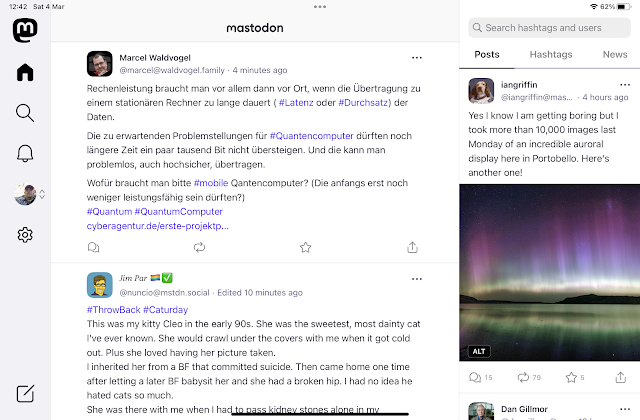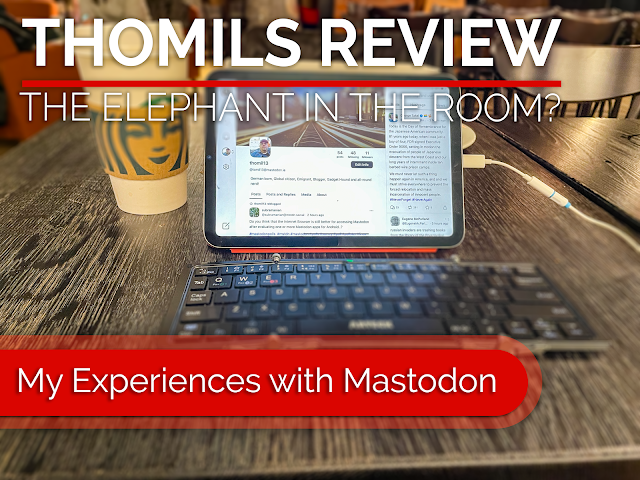There’s no way of putting it gently – Twitter, a social media platform that I’ve enjoyed for years despite its many problems, is in dire straits. Granted, the platform has always had a plethora of issues, but things have really started going down the drain ever since Elon Musk took over. The self-titled “chief twit” has turned out to be a major twat, acting with all the moral authority and subtlety of a Freddy Krueger or a Jason Vorhees. Many of the key staff have been fired, the company has stopped paying rent on many of its offices, oversight has been reduced to next to nothing and what’s worse, Elon the Muskrat has recently been embracing openly neofascist loons and conspiracy theorists.
The results have been entirely predictable. Advertisers are fleeing in droves, users are jumping ship, and the platform itself has shown more and more signs of being unable to handle the load, with bugs and even outright outages becoming more and more frequent. It seems like it’ll only be a matter of time until Twitter finally buckles and collapses. Leaving aside my personal disappointment with Elon Musk, a man whom I used to admire for his work with the likes of Tesla and especially SpaceX, Twitter in itself is pretty unique in its setup. There are a number of platforms that are suitable for long-form content, even though the audiences may not always be (looking at you, Facebook!). Twitter’s requirement for brevity set it apart from most other social media services, both in a positive and negative sense. What’s more, Twitter was always pretty effective in bringing at least a handful of visitors to my own blogs whenever I used it to promote my blog posts. So, with that platform seemingly in a tailspin, what could replace it?
Enter Mastodon, the supposed second coming of social media. Over the last few weeks and months, this platform has been touted as THE replacement for Twitter, going so far as to get the chief Muskrat to briefly ban all links from Twitter to other social media profiles. It supposedly has all the good aspects of Twitter, without a megalomaniac billionaire tech bro to screw things up. Indeed, there has seemingly been a considerable migration (stampede?) of Twitter users over to Mastodon ever since Musk took over. And on the surface, this looks to be true.
For starters, Mastodon is not one single entity. It is a decentralised ecosystem consisting of myriads of servers using the same interoperable protocol. The details of this “Fediverse” are a bit more involved than that, but that is the general gist of it. This does mean that you’ll need to pick a server when signing up, however that is far less intimidating than it might at first sound. You should have a read through the description of the server you want to sign up on, just to know what any moderators on that server would prefer to be posted, or not posted, but once you’re signed up, you’ll still have access to the entire system. I’m on mastodon.ie, being based in Ireland, but you can find a list of nearby Mastodon servers in your area using this link.
Once you’re signed up, the feed you’re confronted with might at first glance seem eerily similar to Twitter. However, these similarities are pretty much just skin-deep. The feed is purely chronological, showing only posts, post boosts or other activities from accounts you’re following. There’s no algorithm that tries to guess your interest or attempts to profile you, no advertisements, artificially promoted or boosted posts, or similar shenanigans. What’s more, the character limit is larger than over on the Bird site, as Twitter is often referred to on Mastodon, with Mastodon allowing for up to five hundred characters. This allows for much more nuance in posts and makes actual conversations a lot easier, while still encouraging brevity.
So that all sounds really good. In fact, it sounds almost too good to be true. However, there is a rather sizeable pachyderm in the room that we need to address. And yes, I’ve been waiting since the beginning of this blog post to make that particular pun! Can Mastodon actually live up to the media hype that has been whipped up over the last few months?
Yes and No. Allow me to elaborate.
Once you’re signed up, Mastodon really feels like you’re back in the good old days of social media, when Facebook, Twitter and other platforms were actually fun to use. The chronological feed alone is a sight for sore eyes, it really is refreshing not to have days-old posts endlessly regurgitated. The same goes for the near-complete lack of commercial content. Granted, major tech sites tend to have a presence on Mastodon, but you’re not getting bombarded with questionable ads from some shady drop-shipping outfit trying to hawk the latest “tactical flashlight”, or Cyprus-based mobile games developers pushing their latest rip-off game right into your face. Seriously, companies like Nexters Global make me wish that the Cyprus conflict would turn hot again just for a chance of a JDAM hitting their HQ!
 |
| Whether it's the phone (above) or the tablet app, both of the official Mastodon apps are functional, if not particularly attractive. |
Anyway, back to the topic at hand. The character limit is significantly higher as well, with Mastodon allowing for up to five hundred characters per “toot”, which to be fair is a horribly stupid name for a social media post. The character limit is significantly more generous than the 280 characters on Twitter, allowing for a lot more nuance in posts, while still encouraging brevity.
The biggest difference when I first joined was the tone of the conversation. Whilst Twitter has increasingly become hostile and dominated by racists, neofascists, crypto scammers (and that’s just the CEO!) and other questionable individuals, Mastodon seems to be significantly more chill. There’s far less “preachy” content on the platform that I could see and back when I joined in November 2022, many people were simply trying to learn the ropes. What’s more, the decentralised nature is rarely ever noticed in everyday use. That’s not to say there isn’t any drama on Mastodon, there certainly is, but I haven’t seen anywhere near the same level of vitriol as over on Musk’s ego trip site.
However, it’s not all sparkles and unicorns. Mastodon does have significant downsides that really hamper its success. For starters, the search function and content suggestions really aren’t that good, making it surprisingly hard to both find accounts to follow and for other users to find you. While I’m generally a fan of the pachyderm’s purely chronological feed, there’s no denying that algorithm intervention has its upsides as well when it is properly employed. On a related note, the non-commercial nature of Mastodon is not only the platform’s greatest strength, but also its greatest weakness. It is quite simply a lot harder to promote anything even remotely commercial, even if it’s just your own blog. Not only is your content harder to find for potential customers, readers or watchers, you’re bound to encounter significant pushback as well. I’ve seen more than one case of artists or artisans suffering significant, often sustained harassment for simply promoting their Etsy store.
In that regard, Mastodon unfortunately suffers from all the same issues and shortfalls that most open-source projects and platforms are subjected to. It is driven by idealism, with little regard for usability or long-term sustainability. In the same vein, it is not really accessible to newcomers, requiring a lot of effort to make the platform work for you. At the same time, it is anti-capitalist and anti-commercial at an almost pathological level, making it nearly unusable for anyone looking for a new way to promote their blog, Etsy store or other project. However, it would be unfair to simply write off Mastodon as yet another half-finished open-source carcass littering the internet. Mastodon really does feel refreshingly calm and yes, even exciting sometimes, just like social media was back in the early days. You just need to be willing to deal with the downsides of the platform.
All of this goes a long way towards explaining why activity on my feed has dropped considerably since I joined back in November. There just isn’t a lot in it for casual users, and while I’m sure that Mastodon can offer a lot for people who are willing to invest the needed time into making the platform work for them, I already have a full-time job and quite frankly don’t have the energy left at the end of the day for that. I’d love for it to become more dominant, and I’ll definitely be keeping my account, but as it stands, it just isn’t there as a real alternative or replacement for Twitter.



Comments
Post a Comment